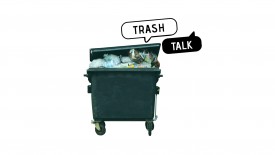Green lifestyle
8 related episodes
Extreme weather and global warming are threatening the world. It’s time to learn more about green lifestyle to save our world. ‘Go green’ now, reduce the use of energy and wastage disposal.
 Loading ...
Loading ...《Trash Talk》 Trash Talk - Recycle and reuse large home appliances (3-9-2018)
2018-09-03
返回
《Trash Talk》 Trash Talk - Recycle and reuse large home appliances (3-9-2018)
2018-09-03
Kicking off the first episode of a new Green Monday feature series called Trash Talk, Marcy Trent Long tells us about the just-opened electronic waste recycling facility in Hong Kong. She discusses how to recycle and reuse large home appliances with Nigel Mattravers, the general director of ALBA.







